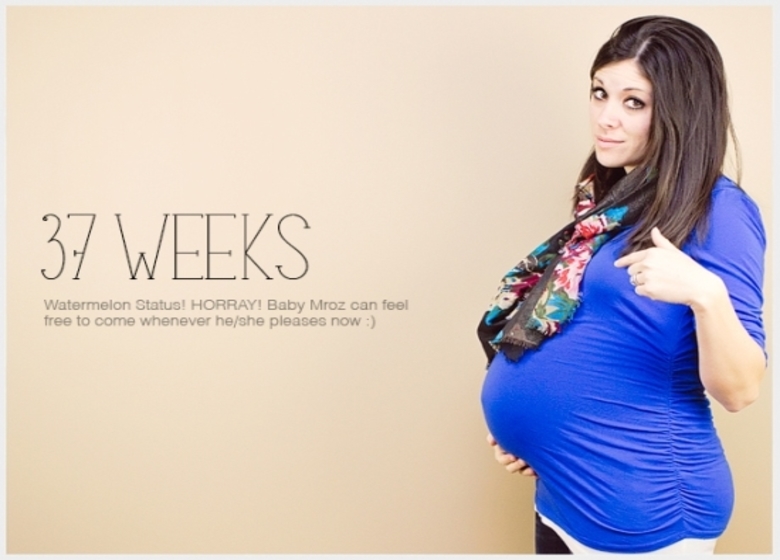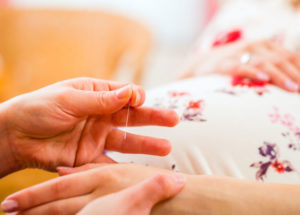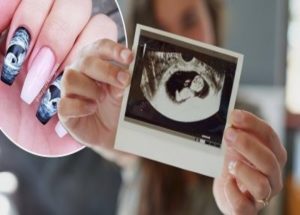37 Weeks Pregnant: What To Expect?
With labor just around the corner, the baby has matured most of its organs by the beginning of your 37 weeks pregnant and can survive without any difficulty to the outside world.
Baby’s Growth During Pregnancy – Week 37
Some of the developments with your baby are as follows:
- Toenails: By now, the toenails should have grown enough to cover the toe completely. They will continue to grow so that you can always expect your baby to have slightly overgrown nails when they are born.
- Mammary glands swelling: Placental hormones send chemical signals to the pregnant mother to start the process of lactation. Also, these placental hormones find their way to the baby whose mammary glands start swelling. Once they’re out of the womb, these will return to normal.
- Armed with Antibodies: The umbilical cord begins pumping the baby’s body with antibodies to help fight off after birth disease and infection. Breastfeeding supplements this once the baby is out of the womb.
- Fully Formed Lungs: The baby is ready to be released as by this time the lungs are fully functional. By producing a lipoprotein called surfactant, they will support the baby breathing outdoor air.
What is the Baby’s Size?
Baby size is about the size of a Romaine Lettuce when you’re 37 weeks pregnant. It is about 19.1 inches long and has probably reached 2.8 kilograms of weight. It’s about the same weight as a kangaroo baby!
37-week Symptoms of Pregnancy
Symptoms can be confused with signs of labor at 37 weeks of pregnancy. Here’s what this week you might feel:
- Heartburn. As you approach your due date, the baby continues to put pressure on your digestive system.
- Spotting: A little spotting at week 37 of pregnancy is normal — remember, while you’re pregnant, your cervix is extra sensitive, so sex can irritate it and bleed it. But if it’s more than just a few drops of blood, call your doctor. Vaginal bleeding may be a sign of placenta problem (such as placental abruption) and it is important to seek immediate treatment. Do not confuse spotting or bleeding with the “bloody show,” a blood-tinged discharge that is a completely harmless sign that your cervix is changing to prepare for delivery.
- Stretch Marks: Sorry, but there may be new stretches on your pregnant belly for 37 weeks and every week from here on. Keep the body oil on hand and lather up as soon as possible. Also, if you go to the bathroom, keep drinking lots of water, oh, every two minutes.
- Abdominal Pressure: If the baby has dropped in anticipation of labor into your pelvis, he or she will put increased pressure on your abdomen, which may cause you to feel some new aches and pains below — and a greater urge to pee too!
- Trouble Sleeping: Sleeplessness is something that at some point during pregnancy will affect all pregnant women. The reasons for this include frequent urination, uncomfortable position of sleep and anxiety.
- Contraction. Cramping or contractions should be expected at 37 weeks. After all, you’ll soon have a baby— the ramping up of your body! You may find that if you sit down or lie down, your contractions will go away. That means they’re Braxton Hicks— not contractions of real labor. Make sure you stay hydrated as dehydration can get you to work early.
- Nausea: An upset stomach during pregnancy is typical of almost any time. But now that you’re so close to your due date, it might be a sign that you’re going to get into work soon. (Whoa!) If your nausea is severe — especially if you vomit — tell your OB so that it can rule out disease or complication of pregnancy such as HELLP or preeclampsia.
Pregnant with twins for 37 weeks? 57% of twins are born before week 37 of pregnancy, so if your twosome is still hanging there, you are in the minority of multiple moms. And while you’re probably feeling really uncomfortable and anxious to get those babies out, by sticking it out you’re doing a really good thing for their health. We could never be ready for it (well, perhaps you’re one of those women who do it until week 42), and you and your baby’s in good hands when you’re under the care of your OBs and your doctor.
Remember, pregnant labor is naturally not recommended at 38 weeks— baby usually needs a little more time indoors— and some methods are not considered safe. So if you want to try to stimulate yourself to work, first check with your doctor and wait for your baby to be “full term” for at least another week.
37 WEEKS LABOR SIGNS
Pregnant for 37 weeks is the perfect time to break the signs of labor. Your chances of getting into work are rising every day, and who wants to be stuck in a car giving birth because they’ve been waiting too long to get to the hospital? (We don’t mean scaring you— the chances of giving birth in a car are low. We just want you to be prepared.)
The different signs of labor tend to fall into two categories— those that mean it’s coming soon and those that mean it’s happening right now. If you notice these signs of work at 37 weeks (although we can’t say how soon — every pregnancy is different, you’ll soon get into work.
- Mucus Plug and/or bloody show: You can see a small amount of thick mucus in your underwear, either in a large globe or slowly. This is the mucus plug that has always protected your cervix. The mucus plug is released as your cervix dilates to make way for the baby. The mucus plug may or may not contain a blood tinge in it — if it does, it is the “bloody show.”
- Nausea. Some women swear that just before labor begins they begin to feel sick to their stomach. So, pregnant at 37 weeks, nausea may soon mean baby’s coming.
- Diarrhea. When you’re pregnant for 37 weeks, diarrhea can only be diarrhea, or it can mean imminent work. That’s because they can also stimulate your bowels as your hormones change to prepare for delivery.
Below are the signs of labor here — this means immediately calling your OB:
- Water Breaking: It’s probably amniotic fluid if you feel water leaking out — either in a gush or a trickle. Most women go to work within twelve hours of breaking their water.
- Regular Contractions. Has your abdomen tightened on the reg for 37 weeks pregnant? If the contractions continue to repeat and appear to occur more and more frequently, you’re in work. It dilates your cervix as your uterus contracts so that baby can pass through at delivery. If this is your first pregnancy, you may have several hours of regular contractions before going into what’s known as “active labor “— that’s when contractions get really painful and you’ll need all your attention. (When you’re supposed to be in the hospital!)
- Back Pain: Ah, the worried “back Labor!” “Sometimes the baby is placed in a way that puts extra pressure on the spine of the mother. If the dick you have is severe or if the pain radiates from your abdomen to the back (or vice versa), it might mean you’re working. It is more likely to cause you to get pain in the back.
Your doctor will tell you where to get your stomach pregnant at the hospital for 37 weeks. You may have to be monitored for infection if your water has broken. So your doctor will advise you to be admitted right away. If you have contractions, it probably takes five minutes or less until you are admitted into many hospitals, so the farther you go, the sooner you need to leave your home.
Many mothers are dying at 37 weeks to know how to induce labor. But don’t get yourself ahead! A fetus of 37 weeks is considered to be “early term,” meaning that doctors are not yet recommending to induce or do a c-section. That’s because some babies need a few more weeks to complete development at 37 weeks of pregnancy. It’s totally cool if you’re going to work naturally, but there’s no need to rush things. You may feel free to take a long walk, have sex, or have acupuncture done in hopes of naturally inducing labor once you hit 39 weeks, which is considered “full term.”
These things are considered safe and can work (although they are not proven!). But seriously, for a couple of weeks, hang tight. It can make a major difference in your baby’s health at birth. Consider this the first of many selfless acts of love you’re going to do for your child!
37 Weeks Ultrasound
Baby has some cool new abilities to practice: inhalation, exhalation, sucking, gripping, and blinking. Baby gets the first sticky poop (called meconium) ready for his first diaper in less cute news. As part of a biophysical profile, an ultrasound of 37 weeks could be performed. The profile is designed with an ultrasound and the results of the non-stress test to measure baby’s well-being.
For moms who are pregnant with twins for 37 weeks, your doctor may talk to you about induction or C-section (depending on the history of your health and the status of babies). Some doctors recommend that this occurs with twins at 38 weeks pregnant. So you can meet your babies within a week! No matter how or when your baby (or babies!) will be delivered. Try not to get too impatient waiting for the baby. Remember it might be any day now— or it might be a couple of weeks. If you feel antsy, go clean up something else. (Do you think you have it all? Look behind the fridge.)
Also Read: 36 Weeks Pregnant: What To Expect?













